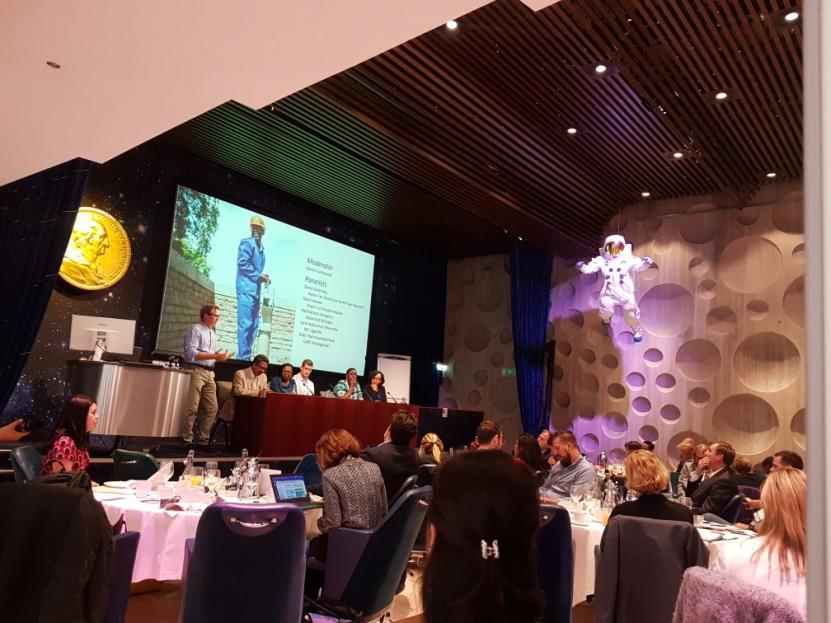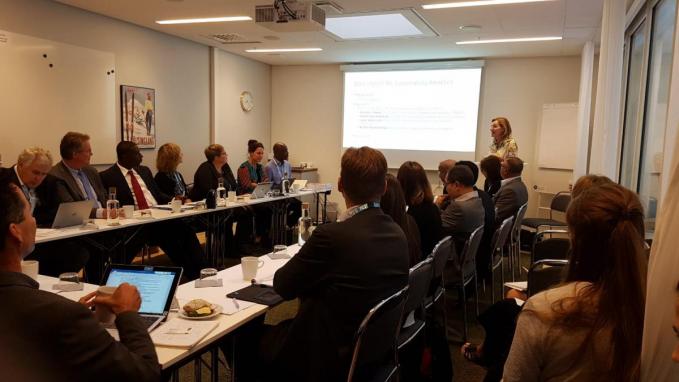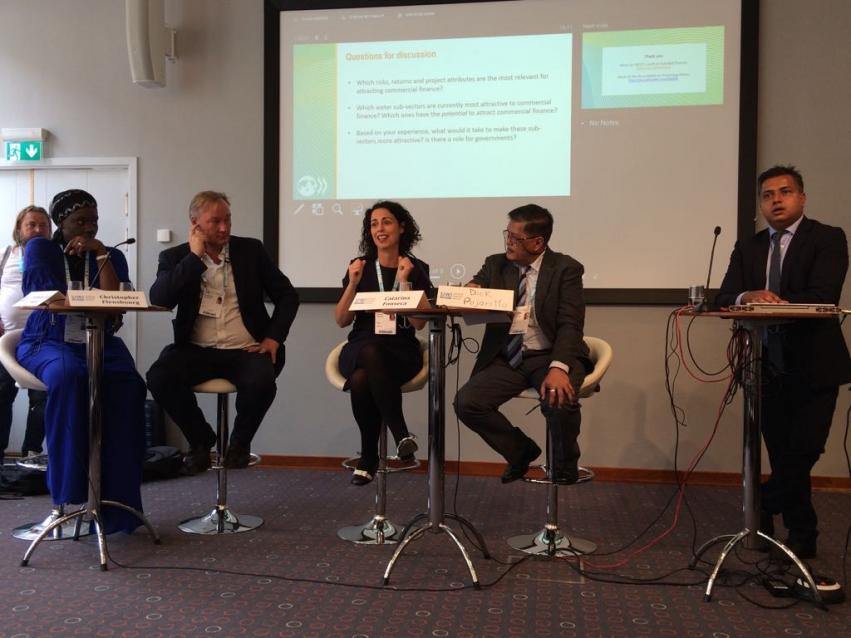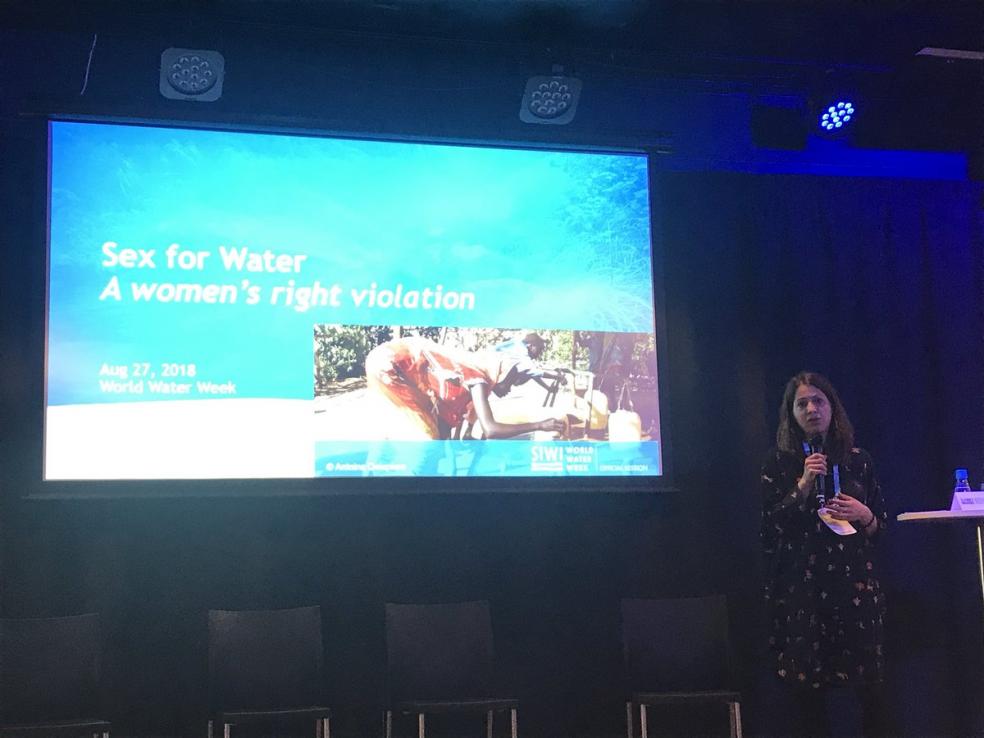
IRC perspectives: reflecting on day 1 and 2 of the Stockholm World Water Week 2018
Published on: 28/08/2018
This week, IRC and partners are at Stockholm International Water Institute's (SIWI) World Water Week, focused on the theme "Water, ecosystems and human development". The events co-hosted and attended by IRC have touched on a dynamic range of topics which we've divided into four main themes: WASH systems and sustainability, finance, gender and WASH and hygiene. For those interested, the IRC communications team at SWWW (Vera van der Grift, Sára Bori and Dechan Dalrymple) gathered the reactions and impressions of our colleagues in response to the sessions attended. Read what they have to say so far about the world's largest water conference:

Louis Boorstin: My six reflection points from the Agenda for Change session are the following; that we need to:
1. Really understand the political economy
2. Get out of the comfort zones of WASH and deal more with media, parliament, finance institutions
3. Understand and appreciate that we can lead from the background—so that we provide the platforms, data and capacity that include and engage all voices
4. Promote systems leadership that recognises partnerships that understand collective action which overcome organisational issues
5. Always remember that systems change is not static, it is dynamic and adaptive
6. Secure the money and the funding scenarios to continuously adapt and improve
Elynn Walter: As we already know, there's an extensive amount of work happening around applying systems approaches at the district level. There are interesting examples as to how this holistic approach is being implemented, but unfortunately we're not where we want to be yet. What is clear though, is that we need stronger partnerships and collaboration around this systems approach.
Lauren Yamagata: The high levels of attendance demonstrate that the desire to understand and engage with a systems approach is very strong. We're getting great feedback from a lot of people and we're beginning to see systems change being a defining part of the narrative for the next few years.
Jane Nabunnya: It was a very interesting session. It showed that most of our partners come from the WASH sector, highlighting an important area for improvement. There is a clear need to diversify our partnerships and to look beyond the WASH sector for fruitful collaborations.
Angela Huston: What kind of resources and information and capacity are needed to help our organisations and individuals act more in line with their principles and in line with current discussions of best practices?
For more information about Agenda For Change click here.
While at the Agenda For Change breakfast, a full room was discussing systems, just a couple of streets away, another breakfast meeting put sustainability at the forefront. The Sustainability of WASH services session was initiated by the Dutch Ministry of Foreign Affairs and moderated by IRC Associate, Erma Uytewaal.

Erma Uytewaal: It was great to see high level government officials initiating and participating in conversations around experiences with sustainability tools. What really inspired me was to repeatedly hear representatives of government confirming the value of these tools; they initiate dialogue with a wide range of stakeholders on the sustainability of WASH services and the role of each actor in achieving this. There was a clear appetite for discussion so next year we hope to organise a longer session on this topic.

John Butterworth: Will blended finance lead to big financial flows of private capital to fill the WASH funding gap? I would say that is very questionable in most countries. But perhaps it could unlock a useful movement if it encourages us to build financially healthy water service providers.
Catarina Fonseca: In all conversations around blended finance it is important to bring the enabling environment (people, skills and performance needed for delivering sustainable WASH services) into the discussion. It is great to see everyone (development banks, impact investors, donors, NGOs and philanthropic organisations) saying this in sessions around finance. Now, I want to see the funds flowing too...
Nicholas Dickinson: What I found interesting about the session was that blended or braided finance is not just about bringing different streams of finance together. It's about a combination of effective technical and financial services—and you can't really successfully run one without the other. Another important aspect of the session touched on the need for some level of professionalism on blended finance in the sector, but also for evidence that this type of financing actually works.
Patrick Moriarty: There have been some very good finance sessions happening. However, what I see is that there are still people looking for a magic money tree that doesn't exist. Our challenge as a sector is to realise that the only way to go is to professionalise and to monetise the externalities.
Find out more about these sessions here.
Jane Nabunnya: We played a game on reaching universal access in a fictitious district, organised by Stanford University and the Conrad N. Hilton Foundation. It was a good scenario for learning – and illustrating how to best make choices as an investor by looking at various factors that guide these choices.
Find out more about this session here.

Vera van der Grift and Jane Nabunnya: International Finance Institutions (IFIs) are important players in addressing the WASH financing gap. It was interesting to talk about the role of IFIs in accelerating progress on the SDGs, including increasing financial flows. We also explored how a global partnership can help optimise and harmonise solutions.
Erma Uytewaal: My main take on this interesting session is that the discussion between IFIs, public and private sector funders really has to happen at country level to materialise it. Sanitation and Water for All (SWA) is in a good position to enable this globally but also at country level.
Find out more about this session here.

Bryony Stentiford: Attending a session about sex in return for water brings a whole new lens to the idea of gendered access rights to water. Whilst not entirely surprising that women are discriminated against and taken advantage of when trying to access a basic human right, the practice of extorting sex from women in return for water access is not something that seems to be habitually spoken about. We need to consider then when talking about reaching the poorest of the poor and ensuring that water is accessible for all, that there may be users currently overlooked who are only able to access water through bartering their only commodity of value, their bodies. Such practices may be overlooked and as such give a distorted view of affordable access to water levels. Hence as a sector when talking about equitable and affordable access to water we need to ensure we take factors such as sextortion into consideration.
Find out more about this session here.
Janni Baekkelund Nielsen: This session, based on the Ripple Effect Study by the Coca Cola Company, USAID and IPSOS, was an inspiring session in female leadership and how things can move forward considerably when you engage with women in the communities!
Find out more about this session here.
Vera van der Grift and Jane Nabunnya: The discussion at this session focused on what is working and not working with hygiene behaviour change and how to get government involved in the process. An interesting point was made on the contract management process, which are long processes for both government and donors. When these processes take extensive amounts of time this has clear implications on accountability and transparency.
Find out more about this session here.
Vera van der Grift: Good news was presented for Sustainable Sanitation and Hygiene for All (SSH4A) implementers. Evaluation results on SSH4A as presented by Dr. Joshua Garn, an Assistant Professor of Epidemiology at the University of Nevada, Reno, showed persisting yearly gains in most sanitation coverage and use in most SSH4A countries over time. SSH4A countries, on average realised a 47% increase [compared to an average of 14%].Guy Howard of DFID-UK made the case for balancing technologies and systems when figuring the future of rural sanitation sustainability.
Find out more about this session here.
At IRC we have strong opinions and we value honest and frank discussion, so you won't be surprised to hear that not all the opinions on this site represent our official policy.